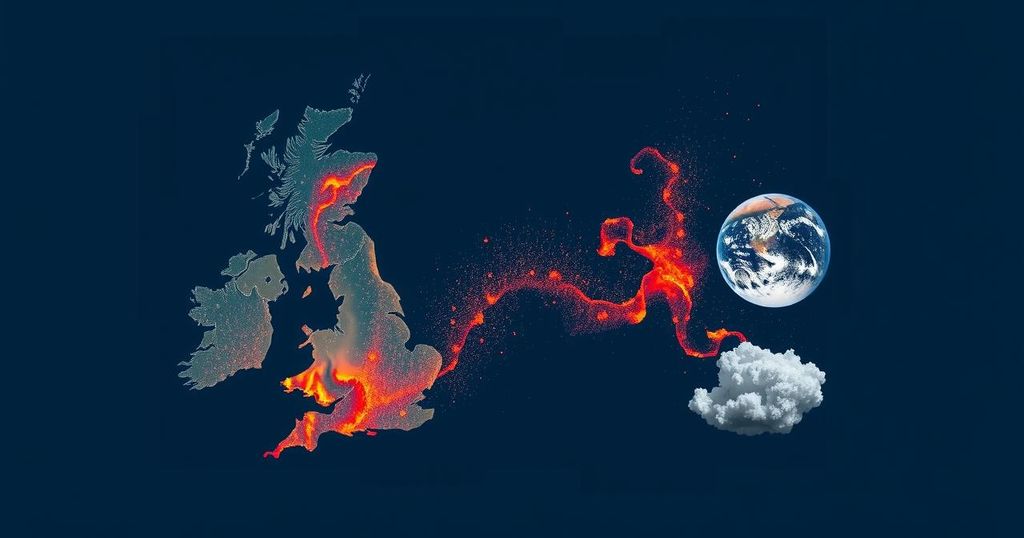Climate change is increasingly recognized as a critical threat to global security, impacting food supply, military effectiveness, and exacerbating conflicts. Nations, including the UK, face operational challenges as military resources are diverted to respond to climate crises. It is vital for governments to implement integrated strategies that address both climate change and national security, ensuring preparedness for coming challenges.
In recent discussions surrounding climate change and security, it has become increasingly evident that the ramifications of climate change extend beyond environmental concerns into national and global security domains. As exemplified during COP29, the narrative often focuses on biodiversity and food production. However, the pressing reality is that climate change poses an immediate and escalating threat to global stability, affecting food security, military capabilities, and fostering conflict.
Climate change is fundamentally altering agricultural viability across the globe. Factors such as desertification, drought, and flooding not only disrupt food supplies but also intensify economic disparities and existing social tensions, often culminating in conflict. The repercussions of these changes have been particularly evident in nations like Somalia, where climate-induced flooding obstructs crucial access routes and enhances the operational challenges for security forces combating terrorist organizations such as al-Shabaab.
The military worldwide bears both direct and indirect consequences from climate chang involve extreme weather events that have required military intervention in numerous countries. For instance, the damage inflicted on installations like Tyndall Air Force Base by Hurricane Michael underscores the vulnerability of military operations to climate phenomena. Furthermore, the Canadian military’s readiness is compromised, with only 58% of forces deployable in NATO scenarios, reflecting how climate-induced risks can hinder combat preparedness.
In the United Kingdom, similar trends are observable. The military is increasingly diverted from its primary role of national defense to assist with humanitarian needs stemming from climate crises, such as the recent operational shifts of HMS Trent. Training days are lost due to rising temperatures, impacting the forces’ effectiveness both domestically and internationally. Moreover, infrastructure is under threat as evidenced by incidents at RAF Brize Norton, which had to suspend operations due to runway melting.
Furthermore, the implications for Navy operations are substantial. With the melting Arctic ice, traditional waterways for submarines may alter, affecting operational security and strategic military positioning. The UK must proactively assess its own maritime and military strategies in light of these developments to maintain security.
To adequately confront these challenges, the UK government must prioritize an integrated approach to climate security, ensuring that defense, development, and diplomatic efforts are synchronized. Not merely focusing on net-zero goals, the government needs cohesive strategies to bolster military readiness and resilience against the multifaceted risks of climate change, including food shortages, migration-driven conflicts, and economic instability. The time for decisive action is critical, as failure to adapt will inevitably result in significant geopolitical repercussions.
The interconnectedness of climate change with national and global security has become a focal point of contemporary discourse. Events such as COP29 have highlighted concerns regarding the environmental impacts of a warming planet, while the broader implications for military capabilities and international stability are often underscored by experts. Recent instances of severe weather events necessitating military intervention across various nations illustrate how climate change is reshaping operational capabilities and amplifying risks for vulnerable populations, thereby demanding immediate governmental focus on robust climate security policies.
In conclusion, the intertwining of climate change with national security necessitates a comprehensive approach by the UK government. As evidenced, climate change disrupts military readiness, heightens conflict risks, and threatens essential infrastructure. The establishment of cross-departmental policies that incorporate defense, humanitarian needs, and climate-induced socio-economic factors is imperative. To remain prepared for the increasing climate security challenges, the UK must prioritize adaptability and resilience in its defense strategy.
Original Source: wavellroom.com







